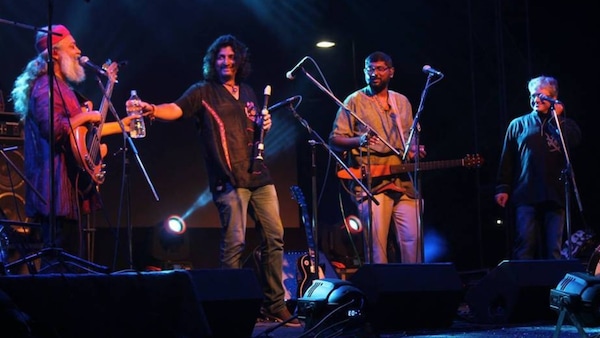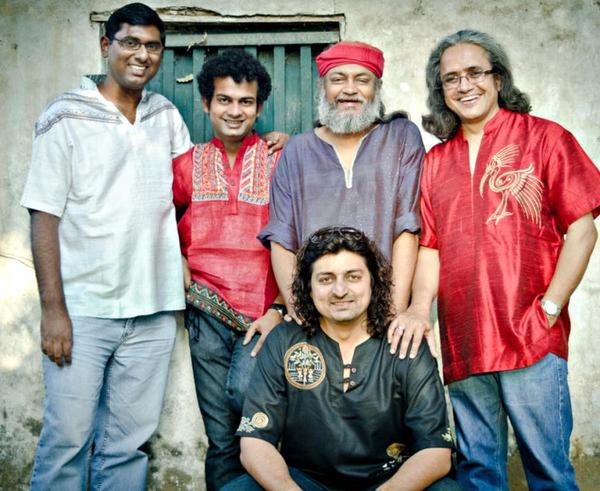Exclusive | Indian Ocean: We’re not out to reform society or preach anything, We’re trying to reflect on our own times
The legendary indie music band, who lent music for movies like Masaan and Black Friday, talk about their new album Tu Hai, the Grammys, and of course, dear society. Read on...

Last Updated: 12.06 AM, Jun 26, 2023
Call us audacious but we reckon it is safe to call Indian Ocean the UB40 of India—a legendary reggae and pop band from England. Often regarded, and rightly so, as pioneers of independent music in the country, Indian Ocean came into being in 1990, and over the last three decades, the band has performed at various prestigious music festivals such as the Glastonbury Festival in the UK, among others.
The band members—comprising Rahul Ram, Himanshu Joshi, Tuheen Chakravorty, Amit Kilam, and Nikhil Rao—are fiercely opinionated in the music they put out, and no, they do not mean to preach or school society. “... We are trying to put out something honest,” clarifies Rahul Ram, who has rendered many classics in his long career thus far: Tu Kisi Rail Si from Masaan and Des Mera Rangreji Ae Babu from Peepli Live comes to mind almost instantaneously.

Edited excerpts from our conversation with the face of indie music in India:
Can you tell us about the inspiration behind the album Tu Hai and how it ties into Indian Ocean's commitment to sustainability and the environment?
So, a commitment to environmental causes is lifelong. And all of us, like most of the people living today, are aware of it and sensitized towards it. But most of all, I think Rahul Ram is the person who's dedicated his life to environmental causes. And so, it's not something he's doing for the headlines, but for the news, it's the lifestyle Rahul (Ram) is living and practicing, and only then promoting the album to her, which is a collection of six songs that kept getting made from the period of 2014 to 2018. And we did not plan it as an album first. We just kept making songs and it so happened that a nice little theme tied up all the songs which is reflecting on sustainability, the environment, climate change, and various little, little problems that are distracting us while something much bigger is going on.
How does the theme of climate change resonate throughout the album Tu Hai, and what message does the band hope to convey to listeners?
Well, every song has its own story and own little message. We are actually extremely modest about the role of art. We don't think we are out to reform society or preach anything. We are just trying to reflect on our own times, our own situations, and trying to put out something that is honest and hopefully also interesting and entertaining and uplifting and that is really our hope with this album to hear.
What do you hope listeners will take away from the combination of diverse collaborations and the overarching themes of sustainability and environmental consciousness in the album Tu Hai?
For example, the song Jaadu Maaya, which is written by Varun Grover has lines like, and we really take this, we interpret this as a, a world which is going to hell in a handbasket. Still, there are some bright lines, bright clouds, and silver linings. But there is so much that's happening around, and we seem to be so stuck in our little, little conflict, whereas something much bigger and much sinister, which is climate change is really coming to get us and there are no systems-wide or global scale thinking on this beyond, you know, headlines and slogans. That's what we felt and that's what we wrote in the song Jeremiah.
How did the collaboration with Grammy Award-winning percussionist Vikku Vinayakram come about, and what unique elements does his contribution bring to the album?
Well, to be able to work with Pundit Vikku Vinayakram was a blessing for us. We did not choose him or rather he chose us. And he's one of the greatest musicians in the world, one of India's finest he's deserved every award he's ever received and is truly a musician in the sense that he is still at this age, I think he's almost 80. He really gets a kick out of playing his instrument just like a child. He's fascinated by rhythms and music, and it is a joy to be around. And yes, it, it so happened that we collaborated with his son, a legendary percussionist Mr. Selvaganesh Vinayakram. And through that, we were able to meet once, and well, he said he'd like to meet us and play with us. And the song happened I think over the period of 2014 to 15, that's when we met him a few times and composed and recorded this song with him.
Can you tell us more about the music video for Jaadu Maaya, directed by Varun Grover and Ankit Kapoor? How does it visually enhance the powerful call to action presented in the song?
Yes. So, I think finally Indian Ocean has made a video that everybody is proud of. And I think the credit for the song, the lyrics, the concept of the video goes to Varun excellently done by Ankit Kapur who worked on, who works on animation. So, I think it, the song is, the video is set in a newsroom where you see the characters of the band performing various roles and reporting in the newsroom and you see little, little things happening.
You know, some iconic images of the world in distress. And this was completely Varun's idea. So, he'll but I, yeah, I do agree that it visually enhances the song, and it brings home a little more immediately what the music and the lyrics were trying to say in the first place.
How does Indian Ocean strike a balance between thought-provoking, socially conscious lyrics and captivating musical arrangements in everything they do? How does this balance contribute to the band's ability to inspire and connect with generations of musicians and listeners?
Well, I think that really is a question for our listeners to answer. If that is really happening, that, you know, our music is connecting with people, then we are blessed because we get to do it more in the future and that's what we love doing. That's what we want to do. We don't want to do anything else with our lives. So, we just try to, we take our own time. We, we make the song with a lot of love and care.
We talk about it, what it means, you know, to everybody individually. You know, because it's sometimes difficult to get five individuals on the same page about a particular song or arrangement or lyrics, but that's why it takes some time. But once we get there, we do that process and we get there, we are quite happy to put it out.
What do you hope listeners will take away from the album as a whole, considering its themes of environmental consciousness, personal introspection, and the importance of collective action?
Well, ideally, everybody should just consume less materially. There's no other way to put it, you know. And now, yes, everybody wants the good things in life, everybody wants progress, everybody wants growth. But in our individual ambitions and goals and kind of getting stuck in our own heads of what we think we need to live a good life.
We are causing dysfunction at the collective level. So, we just want people to reflect on this and the action we hope people will take, whether they take it from our songs or from their own conscience or wherever. You know, we just hope that people will consume less and try to lead, lead more ethical lives. That's the hope.

